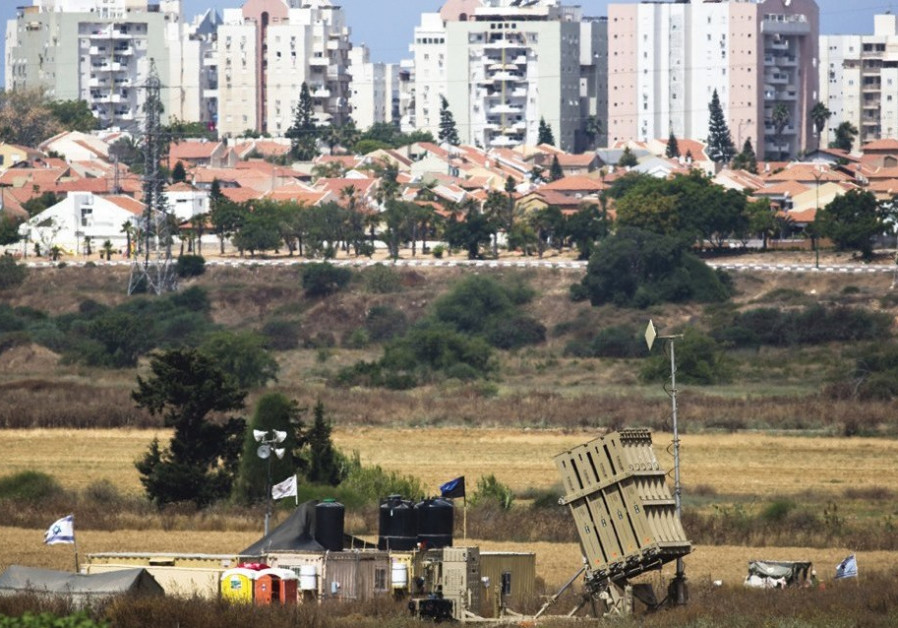What makes Iron Dome so important to Israelis?

AN IRON DOME battery is seen near Ashkelon in June 2015.. (photo credit: REUTERS)
Ahead of the 70th Independence Day celebrations, a majority of Israelis decided the Iron Dome air defense system was the greatest Israeli invention of all times. That was not an easy choice, considering we are blessed with creative minds, scholars and entrepreneurs who excel in world-renowned, out-of-the-box thinking, from academics to the NASDAQ (in which Israel is the most represented country after the US).
In a way, the choice of Iron Dome is obvious: It’s a purely Israeli project, the result of persistent swimming against the current, and it concretely affects a broad range of aspects in the lives of citizens. Iron Dome is not just a military invention, but rather a defense system that helps to prevent wars and potentially bring peace.
The choice of most Israelis is therefore a hopeful one.
The credit for the Iron Dome system goes first and foremost to its developers, eight of whom won the Israel Defense Prize in 2012. That group of eight convinced me of the system’s merits and I decided to authorize its development.
My decision to approve the project faced tremendous pressures from the senior ranks of the defense system, the government and the media saying I should not have done so. When I met the team of developers at Rafael Advanced Defense Systems, I asked them to make an exceptional effort and work on the project two shifts a day. They returned to me and said: “Amir, considering its national significance, we will work nonstop, three shifts a day.” They are worthy of all respect and appreciation.
Two experiences in the past decade made me understand that one cannot compromise the defense of the home front.
My first experience was personal. In April 2001, I was mourning the death of my father. While sitting shiva, our house in Sderot was full of guests who came from all over the country to comfort us. Then, one day, the house was depleted, the guests had gone back home and we were suddenly left alone. That was the first day on which rockets from Gaza began falling on Sderot and other towns (contrary to the popular opinion – encouraged by some on the Right – that the shooting began following the evacuation of the Gaza settlements in 2005).
That was when I realized the severity of the impact from rockets shot at the civil population. In discussions in the Defense Ministry six years later, there were those who said that the investment in the Iron Dome defense system wouldn’t pay off, because car accidents have a greater toll than Kassam rockets. I responded resolutely and said that while a road accident is a tragedy for the families involved, when a missile lands at the heart of an Israeli town – the entire Israeli society feels threatened and the basic treaty between the state and its citizens is badly fractured.
IN 2006, during the Second Lebanon War, I faced the combined challenge of overseeing the front in south Lebanon – where our soldiers combated Hezbollah – while dealing with the great loss of life, property and national morale.
The defense granted by the Iron Dome system does not prevent taking necessary offensive measures – but it allows decision makers to conduct the effort in a calculated and strategic manner. In August 2006, I therefore decided that the Iron Dome system was the most important project for defense of the home front and classified its development as an “emergency program.”
The importance of the Iron Dome is certainly also economic, preventing loss of property, giving the market the ability to continue to function also during a prolonged period of war (as was the case during Operation Protective Edge in 2014), and of course in preventing a war. It’s true that the Iron Dome system is more expensive than the primitive rockets it intercepts, but past strikes of the enemy’s rockets cost us dearly and the retaliatory air strikes we conducted in Gaza were costly.
Wars in the 21st century do not resemble those of previous ones. Therefore, in addition to Ben-Gurion’s doctrine of deterrence, early warning and decisive victory, there is a need for defending the home front.
In fact, Iron Dome was one of many resolutions I took as part of my policy of defending the home front: sheltering the Israeli towns around Gaza, authorizing the David Sling system to intercept mid-range missiles and drones, and establishing the National Emergency Authority (RACHEL). Defending the home front is not just a matter of technological development and budgetary considerations – it reflects a comprehensive worldview.
The next step that is needed – along with continued investment in developments such as the remarkable technology used to detect and eradicate the Hamas attack tunnels on the Gaza-Israel border – is legislation to further help defend the home front. Gaps exist primarily in the north of the country, but not only there.
A future war would hurt every part of the country and the old shelters do not provide an appropriate solution to contemporary threats. Therefore I am promoting a bill of a “home shelter for everyone” with MK Avi Dichter that calls for government support for building a sheltered room in every house and apartment where one does not already exist.
Every shekel invested in projects such as the Iron Dome air defense system helps to solidify the basic commitment of the state toward its citizens. A well-protected home front raises the level of frustration on the other side, lowering the motivation to use military force. In the future it might compel our greatest enemies to come to the negotiations table.
The writer served as defense minister and currently chairs the Subcommittee for Home Front Defense of the Knesset Defense and Foreign Affairs Committee.





Comments are closed.